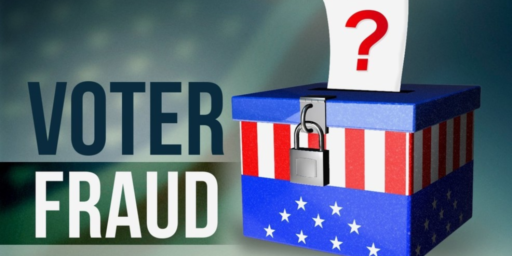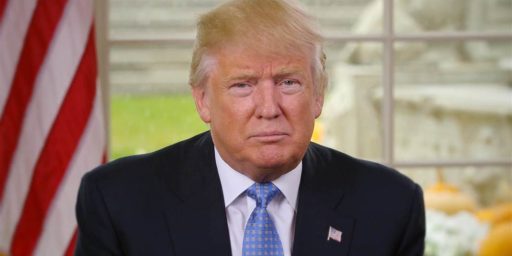Reflections On “Voter Fraud” And The Design Of Government Systems
Are 20 arrests worth a $1.2 million dollar investment?
![[Voter Fraud Graphic]](https://otb.cachefly.net/wp-content/uploads/2019/02/Voter-Fraud-570x321.png)
Last night, the Washington Post reported that Florida Governor Ron DeSantis announced that the state’s new elections police force had arrested 20 people on charges of having voted illegally in the 2020 election. These mark the first arrests by this the new Office of Election Crimes and Security, which was created earlier this year by the GOP-led state legislature.
A few facts before going further:
- In the 2020 Presidental election, there were 11,067,456 votes cast in Florida.
- The Office of Election Crimes and Security received $1.2 million in state funding for the 2022-2023 budget cycle.
- The Office of Election Crimes and Security is staffed by 15 new positions.
While these are probably not the last arrests to be made by this unit (and note that the people arrested are only beginning this new journey through the criminal legal system), we should not that their votes account for .000181% of the total vote in Florida.
So who were these 20 people? All of them are people who are living with felony convictions for either murder or sexual assault. Those are the two categories of conviction that were not included in the 2018 amendment to the Florida Constitution that restored voting rights to people who had successfully completed felony sentences.[1]
In this case, at least, there is little question that unless they had received relief from the Governor’s office, they should not have been voting. We’ll set aside any possible confusion they might have had over the amendment aside for this discussion.
Likewise, we should note that this is a case of “illegal voting” (a person casting a vote for themselves illegally) versus the idea of “voter fraud” that has been advanced by people like Dinesh D’Souza (people illegally casting votes for other people or stuffing ballot boxes).
As someone involved, tangentially, in the creation of policy I think it’s worth looking at this case from a systems design and budgetary perspective.
DeSantis has formerly stated that the 2020 election in Flordia represented the “gold standard” for elections. And yet, he urged the legislature to spend 1.2 million dollars on creating a new police unit to investigate election issues. Granted, with a state budget of over $109.9 billion that’s a relatively small amount (though percentage-wise it’s still a greater amount than the percentage of illegal voters the unit has arrested to date). But we still should ask if it’s a useful use of taxpayer dollars and law enforcement resources.
As Steven Taylor has covered here, while illegal voting and voter fraud does happen, it is rare and very rarely (if ever) has a significant impact on outcomes of races (especially those above the local level). Given those facts, it’s worth asking two questions: (1) how much should we be spending to proactively seek out illegal voting (especially almost 2 years after an election takes place), and (2) what is an acceptable amount of potential fraud.
The second question may cause some discomfort to read. For many, the knee-jerk answer might be “zero!” there should never be any fraud allowed in a system. However, from a policy design perspective, that isn’t necessarily the case for two key reasons. The first is that trying to get to net-zero typically involves an incredible investment in infrastructure to actively monitor for fraud. And as we know, infrastructure investments are not cheap. Beyond monetary investments (e.g. new secure systems and person power) there are also often investments to change policy.
That get’s us to the second reason that net-zero shouldn’t be a goal: administrative burdens. Administrative burdens are the additional administrative work, typically created through statute and policy, that must be done to perform a task. And, generally speaking, in the US we tend to shift those burdens onto citizens and not the government (or rather government workers).
Let’s provide an example of what that could look like in the voting space. There are people who push for the idea of having a government ID to vote. There are multiple ways that this could be facilitated. One that places most of the administrative burden on the Government would be to make these freely available from any government office (with provisions for communities that exist in “deserts” where the nearest post office is over X miles away). On the other hand, a system where these IDs are available, for a fee at, county Department of Motor Vehicles offices has shifted the burden more and more onto the citizen and off of the government.
The reality is, as administrative burdens are added with the goal of driving fraud to net zero they are also going to disenfranchise citizens who otherwise would be able to vote legally. And so we reach a point of diminishing investment where, in the name of protecting the vote, we end up weakening the democratic foundations of the country. We see similar problems with the current social safety net where the very protections that are, in theory, intended to prevent fraud often prevent people from accessing the safety net when they need it.
To be clear, this isn’t advocating for allowing rampant fraud and abuse. Or for eliminating all administrative burdens (though there are far too many today). I am, instead, calling for serious cost/benefit discussions about policy decisions. And that requires us to ask, is it worth investing $1.2 million and creating 15 full-time law enforcement positions to track down 20 illegal votes? And what should be the threshold where that’s considered a success? 100 illegal voters (.00090% of 2020 voters)? 1,000 illegal voters (.0090% of 2020 voters)? The delta between Trump, who won the state, and Biden was 371,686 votes.[2] What is the point where we should be concerned about additional protections to prevent mass illegal voting? And why?
Those are the policy conversations we should be having.
[1] – As Steven noted at the time, Florida Republicans essentially gutted the amendment to continue to suppress the vote by requiring people with felony convictions to have to repay all punitive fines and fees first. The problem with this is there is no clear public data as to what fines and fees an individual owes due to the inadequate criminal legal system data architecture. That said, the 20 individuals in this case were already excluded because of conviction type.
[2] – It’s worth noting again that the Trump campaign never contested the legitimacy of the vote in Florida or any other state that they won. In that respect, DeSantis is addressing a problem that the leader of his party never suggested existed within the state.






First, let’s not delude ourselves, this was pure kabuki by DeSantis.
Second, we don’t do ‘policy conversations’ these days, primarily because the radicalized Republican Party does not care about ‘policy discussions.’
So, all 20 of these people were ones with felony convictions. This, I am guessing, means that DeSantis will next be going after these double-Trump voters next, right?
Once again Republicans spend billions to fix “problems” that are largely imaginary while demonizing Dems spending any amount whatsoever to fix any number of real problems (climate change, the costs of prescription drugs, etc).
I suppose one could shrug and say, “Well, that’s politics!”
As I always do, I point out that when academic experts rank states’ voting systems for accuracy, security, and ease-of-use, the top few places are dominated by western vote-by-mail states. (Contrary to Gov. DeSantis’ “gold standard” statement, Florida seldom places in the top half.) I live in a particular vote-by-mail state, which no doubt colors some of my statements below.
On your first question… There should be very little additional spent proactively looking for illegal voting; the voting process should be designed to catch almost all such during the election. And the rest of the time, as well. For example, maintaining voter rolls should happen on an ongoing basis, not in sporadic purges. Looking two years after the fact is, for practical purposes, an admission that the voting process was not well designed*.
For your second… Since you used the word fraud, I’ll assume you mean a systematic, organized effort: wholesale fraud, if you will, as compared to retail fraud involving a ballot here or there. The aspiration should be for zero wholesale fraud. And this is the place where contemporary vote-by-mail systems shine. Every step of the process is subject to audit and verification with the other steps. Almost any attempt at wholesale fraud is going to set off all kinds of alarms.
* Not well designed for accuracy, security, and ease-of-use. There’s a very long history in the US of designing voting systems to achieve a different set of goals, like selective voter suppression.
If only we could have a rational debate on matters like this…
Here is a budget breakdown for the Office of Election Crimes and Security.
Am I reading this correctly?
It all comes from General Revenue.
$41,555 in salary + $22,204 in benefits. All your team has to do is catch 5 murderers and/or rapists who cast a ballot every three months.
Not a bad racket.
@Steven L. Taylor: I think my problem is that there is no real rational debate to be had on this. This is a colossal waste of money because voter fraud is vanishingly rare and easily caught. DeSantis is grandstanding, and he’s using the tax dollars of Floridians to do so.
I posted a link the other day to a piece that outlined the massive fraud linked to pandemic relief. Commenter Jon noted that the fraud referenced in the piece amounted to a large dollar amount, yes, but a very small percentage of the overall relief. His point–which I agree with–is that the good produced by getting relief where it was needed FAST was the accomplishment, and that we should always anticipate a small amount of fraud, and in this case the benefits of fast relief outweighed the rare cases of fraud.
The problem with voter malfeasance is that bad actors, and by that I mean Trump Republicans, latch onto any small instances of fraud–which are likely unavoidable because there will always be idiots who think they can outsmart the system (or, in the case of the felons that DeSantis is grandstanding on the backs of, probably a fair amount of misinformation) or the just generally clueless (if we take the guy in Colorado at his word when he said he thought that he legitimately had the authority to cast his missing wife’s vote for her)–they take these cases as a reason to question the validity of the entire system.
I am probably more cantankerous about this issue than most because as I have repeatedly noted, I spent time working in Republican politics. And an absolutely alarming number of Republicans think that Democrats cheat on voting ALL THE TIME, so that means THEY CAN TOO. When pressed for details, they always, always cited Kennedy and Chicago. In 1963. When did they make these broad claims? In the early 90s.
Republicans have convinced themselves that a little bit of cheating is okay because “Democrats do it.”
This garbage that DeSantis is peddling plays right into that thought process. It’s insidious and wrong.
First, if I challenge a Republican with the triviality of actual vote fraud, yes, they’re standard will be zero. In fact, past zero to zero guaranteed without any doubt. That’s partly rationalization, knowing things they advocate make no sense if zero isn’t the standard. Partly it’s a Manichaean world view. And partly it’s a matter of seeing voting as some sort of sacrament.
But this discussion is a category error. DeSantis spent a million dollars, tax money, not even campaign funds, and he got headlines about vote fraud. Pander accomplished. And as a plus, it may suppress votes from others uncertain of their status. He knows, as he is quoted as saying in this post, that FL elections are free of non-trivial fraud. From his point of view that’s entirely irrelevant. He ain’t gonna get the GOP prez election by saying elections are free and fair.
It’s a bit like keeping bears out of Springfield.
@Jen:
Part of me thinks they’re jealous because the examples from the first half of the 20th century in the US are all Democratic. Truman benefited enormously from the crooked Kansas City Democratic machine. There’s not much question these days that LBJ won his first election, so got established in politics, via wholesale fraud. Daley’s Chicago Democratic machine (a friend of mine recollects his Chicago grandfather announcing at the Sunday dinner table before the election, “Vote early. Vote often. Here’s who to talk to.”)
It’s a different world today. Harry Reid may have been the last of the local machine politicians. And so far as I know, Harry never crossed over the line into real fraud, he just organized the sh*t out of things.
@Jen:
Well, my lament is that a rational discussion, if entered into by persons willing to have such a discussion, would net the result that this is a colossal waste of money (and that the evidence of voter fraud/illegal voting is not worth these kinds of efforts).
Is $1.2 million worth it to increase FL voter (specifically, those who vote R) confidence in the integrity of the election and, thereby, reduce the likelihood of another 1/6 event?
In a rational society, DeSantis would be mercilessly mocked for holding a press conference flanked by cops to announce his evidence of “voter fraud”. Even if the facts are as alleged, there was nothing “fraudulent” about what the 20 voters did, the maximum penalties for which are absurd. A modest administrative fine would be more appropriate for a first offence.
At least three of the people concerned have apparently sworn affidavits that election officials told them they were entitled to vote. The whole exercise was obviously another stunt of the kind DeSantis has perfected to grab media attention, with the added benefit of deterring people uncertain of their rights from voting at all.
@Mimai:
If it was, then this might be worth it. But I don’t think any FL folks headed to 1/6 over the votes in thier state.
More broadly, I don’t think there is anything that could be done to prevent the people who believed the election was stolen from believing that.
“If the people fear an imaginary river, do not try to convince them the river does not exist. Instead, build them an imaginary bridge”.
Of course, these days, things start with an effort to convince folks the imaginary river is real and “warn” them about it. I mean, the Q stuff almost seems to me like a parody of “legitimate” political activity.